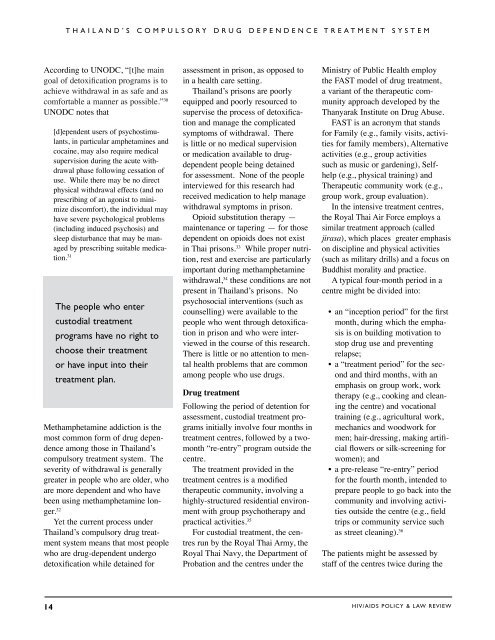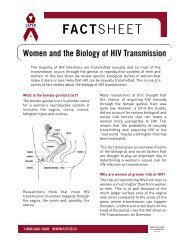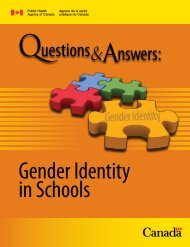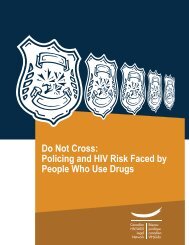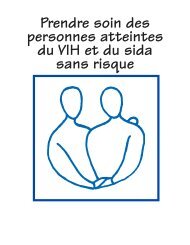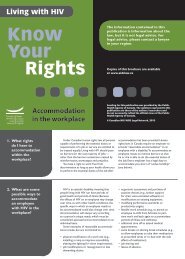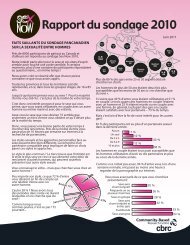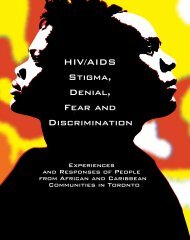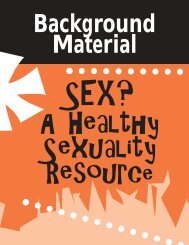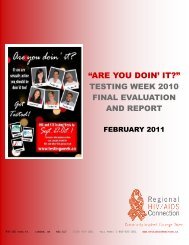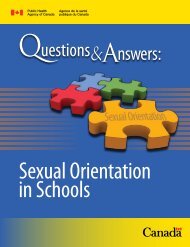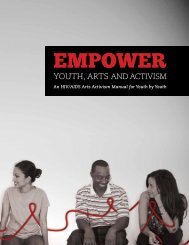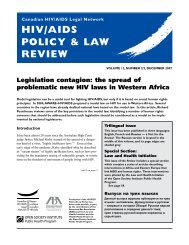HIV/AIDS Policy & Law Review, Volume 14, Number 1 ... - CATIE
HIV/AIDS Policy & Law Review, Volume 14, Number 1 ... - CATIE
HIV/AIDS Policy & Law Review, Volume 14, Number 1 ... - CATIE
You also want an ePaper? Increase the reach of your titles
YUMPU automatically turns print PDFs into web optimized ePapers that Google loves.
Thailand’s compulsory drug dependence treatment system<br />
According to UNODC, “[t]he main<br />
goal of detoxification programs is to<br />
achieve withdrawal in as safe and as<br />
comfortable a manner as possible.” 30<br />
UNODC notes that<br />
[d]ependent users of psychostimulants,<br />
in particular amphetamines and<br />
cocaine, may also require medical<br />
supervision during the acute withdrawal<br />
phase following cessation of<br />
use. While there may be no direct<br />
physical withdrawal effects (and no<br />
prescribing of an agonist to minimize<br />
discomfort), the individual may<br />
have severe psychological problems<br />
(including induced psychosis) and<br />
sleep disturbance that may be managed<br />
by prescribing suitable medication.<br />
31<br />
The people who enter<br />
custodial treatment<br />
programs have no right to<br />
choose their treatment<br />
or have input into their<br />
treatment plan.<br />
Methamphetamine addiction is the<br />
most common form of drug dependence<br />
among those in Thailand’s<br />
compulsory treatment system. The<br />
severity of withdrawal is generally<br />
greater in people who are older, who<br />
are more dependent and who have<br />
been using methamphetamine longer.<br />
32<br />
Yet the current process under<br />
Thailand’s compulsory drug treatment<br />
system means that most people<br />
who are drug-dependent undergo<br />
detoxification while detained for<br />
assessment in prison, as opposed to<br />
in a health care setting.<br />
Thailand’s prisons are poorly<br />
equipped and poorly resourced to<br />
supervise the process of detoxification<br />
and manage the complicated<br />
symptoms of withdrawal. There<br />
is little or no medical supervision<br />
or medication available to drugdependent<br />
people being detained<br />
for assessment. None of the people<br />
interviewed for this research had<br />
received medication to help manage<br />
withdrawal symptoms in prison.<br />
Opioid substitution therapy —<br />
maintenance or tapering — for those<br />
dependent on opioids does not exist<br />
in Thai prisons. 33 While proper nutrition,<br />
rest and exercise are particularly<br />
important during methamphetamine<br />
withdrawal, 34 these conditions are not<br />
present in Thailand’s prisons. No<br />
psychosocial interventions (such as<br />
counselling) were available to the<br />
people who went through detoxification<br />
in prison and who were interviewed<br />
in the course of this research.<br />
There is little or no attention to mental<br />
health problems that are common<br />
among people who use drugs.<br />
Drug treatment<br />
Following the period of detention for<br />
assessment, custodial treatment programs<br />
initially involve four months in<br />
treatment centres, followed by a twomonth<br />
“re-entry” program outside the<br />
centre.<br />
The treatment provided in the<br />
treatment centres is a modified<br />
therapeutic community, involving a<br />
highly-structured residential environment<br />
with group psychotherapy and<br />
practical activities. 35<br />
For custodial treatment, the centres<br />
run by the Royal Thai Army, the<br />
Royal Thai Navy, the Department of<br />
Probation and the centres under the<br />
Ministry of Public Health employ<br />
the FAST model of drug treatment,<br />
a variant of the therapeutic community<br />
approach developed by the<br />
Thanyarak Institute on Drug Abuse.<br />
FAST is an acronym that stands<br />
for Family (e.g., family visits, activities<br />
for family members), Alternative<br />
activities (e.g., group activities<br />
such as music or gardening), Selfhelp<br />
(e.g., physical training) and<br />
Therapeutic community work (e.g.,<br />
group work, group evaluation).<br />
In the intensive treatment centres,<br />
the Royal Thai Air Force employs a<br />
similar treatment approach (called<br />
jirasa), which places greater emphasis<br />
on discipline and physical activities<br />
(such as military drills) and a focus on<br />
Buddhist morality and practice.<br />
A typical four-month period in a<br />
centre might be divided into:<br />
• an “inception period” for the first<br />
month, during which the emphasis<br />
is on building motivation to<br />
stop drug use and preventing<br />
relapse;<br />
• a “treatment period” for the second<br />
and third months, with an<br />
emphasis on group work, work<br />
therapy (e.g., cooking and cleaning<br />
the centre) and vocational<br />
training (e.g., agricultural work,<br />
mechanics and woodwork for<br />
men; hair-dressing, making artificial<br />
flowers or silk-screening for<br />
women); and<br />
• a pre-release “re-entry” period<br />
for the fourth month, intended to<br />
prepare people to go back into the<br />
community and involving activities<br />
outside the centre (e.g., field<br />
trips or community service such<br />
as street cleaning). 36<br />
The patients might be assessed by<br />
staff of the centres twice during the<br />
<strong>14</strong> <strong>HIV</strong>/<strong>AIDS</strong> POLICY & LAW REVIEW


